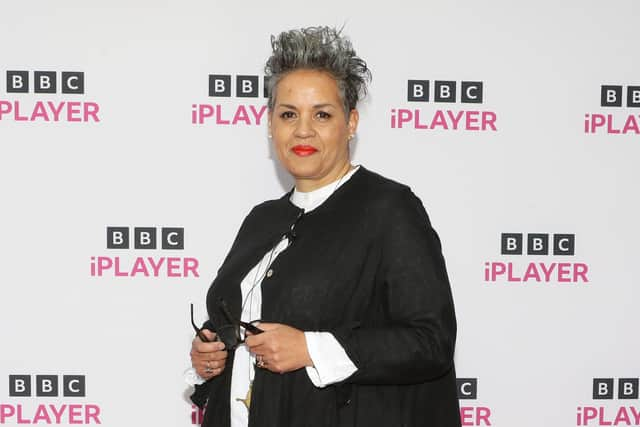Book review: Without Warning & Only Sometimes, by Kit de Waal


Given that around 188,000 books are published in the UK each year, it is not surprising that vortices emerge in the maelstrom. Nor is it unpredictable that some trends are prominent – you do not have to be a seer to have foreseen that there would be a slew of books about Brexit, virology, Ukraine, a former Prime Minister and so on; nor that there would – Lord save us – be a rash of books about people during lockdown learning to bake sourdough or save their marriage or train their Transnistrian rescue dog. But there are occasional convergences that are curious.
I recently reviewed The Last Days, Ali Millar’s harrowing account of growing up as a Jehovah’s Witness. At roughly the same time I reviewed David Collard’s scintillating collection, Multiple Joyce, a series of 100 meditations on Joyce, where the book’s pivot (essay number 50) is about growing up as a Jehovah’s Witness. Now we have Kit de Waal’s excellent memoir, subtitled “Scenes from an Unpredictable Childhood” about growing up as a Jehovah’s Witness. Why should this be? I really have no idea, although I would guess at serendipity rather than destiny.
Advertisement
Hide AdDe Waal is an accomplished novelist, with My Name Is Leon being shortlisted for the Costa and Desmond Elliot prize and becoming a television drama. She is an eloquent advocate for publishing to better represent working class lives, especially in the radio series “Where are all the working class writers?” More importantly, she has put her money where her mouth is, establishing the de Waal Creative Writing scholarship at Birkbeck College, specifically for writers from “disadvantaged” backgrounds. Her work has analysed diversity, and in an interview she has described her and her siblings being “the only black children at the Irish Community Centre and the only ones with a white mother at the West Indian Social Club”. This full length memoir expands on that idea of betweenness, complicated by the religious dimension which stresses being “set apart”. De Waal has drawn on her dual heritage in her novels, but here sets fiction aside; and it is no less compelling. There is discrimination, as one might expect, but it is in the understanding of zealotry that it comes into its own.
As a memoir it does not feel teleological, nor, until the final chapter does it look into how the child of a “haphazard” mother and an extravagant but distant father, in a religious sect, turns into the novelist. There is no sense of “this was because it had to be”. Although usually quite limpid, the prose takes on an electrifying – maybe electrified – quality when de Waal describes the strictures of being part of Kingdom Hall, with sentences a page long enumerating all the rules. It takes on the feeling of a barely suppressed hysteria. The use of photographs gives a sense of snapshots, and it is quite rare to read a memoir and think that it is only part of the story.
Neither creed nor colour determines the book: it is far stronger, far angrier on poverty. Particularly the descriptions of food are immediate, with margarine as a luxury of sorts, as are the logistics of choosing bus stops to minimise the fare or surreptitiously seeking out dropped coins in a launderette. But this does not wallow in privation, and there are moments of genuine charity and warmth. De Waal is very good on daydreaming, as in this passage: “I feel the whole of algebra and my fingertip grasp of long division slip forever into a filing cabinet marked ‘Who cares?’, where it will meet with the chemical symbol for boron, the size of a frog’s heart and the name of the man who invented the heat exchanger. Where’s the story in random facts? Where’s the story in algebra? What’s it for? When will I ever need it? Tell me about the princess and the frog, tell me about the childhood of Mr Heat Exchanger or his wife or his broken arm, and I can plug in again”.
Read in tandem with the other books, it is possible to discern a certain strategy. I do not impute evil intentions to every Witness, and believe some of them to be sincere, if sincerely wrong. But in the targeting of low income families, promises of future abundance, insistence on God’s fury and wrath (and that one needs to protect one’s family from it) and the oppressive nature of limiting access to things, there seems something calculating. I was slightly bemused by the book not recounting whether de Waal was actively disfellowshipped – there is an account, indeed a very funny account, of this happening to someone else. (The fellow in question asks how Noah got to the Arctic to get a pair of polar bears).
By chance I was actually preaching the day after I finished this serious, intelligent book. The lectionary was Isaiah chapter 1, where God is pretty judgmental. But it moves on to redemption, forgiveness and reconciliation. Basically, if a version purportedly about Jehovah doesn’t have that, it is not just a slightly wonky version of Christianity, it is heretical and wrong. All praise to de Waal for calling them out on that.
Without Warning & Only Sometimes, by Kit de Waal, Tinder Press, £16.99. Kit de Waal is appearing at the Edinburgh International Book Festival on 29 August.